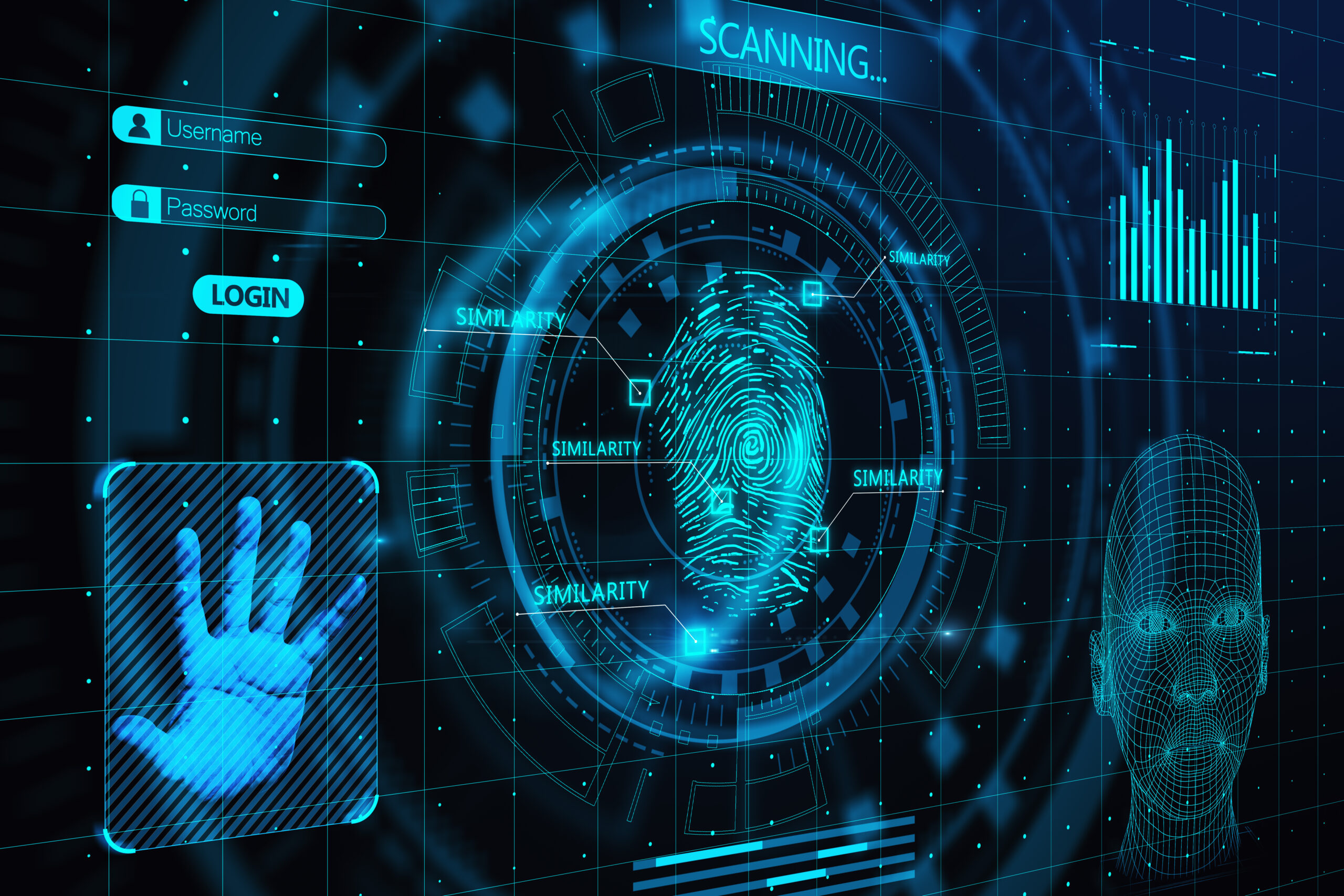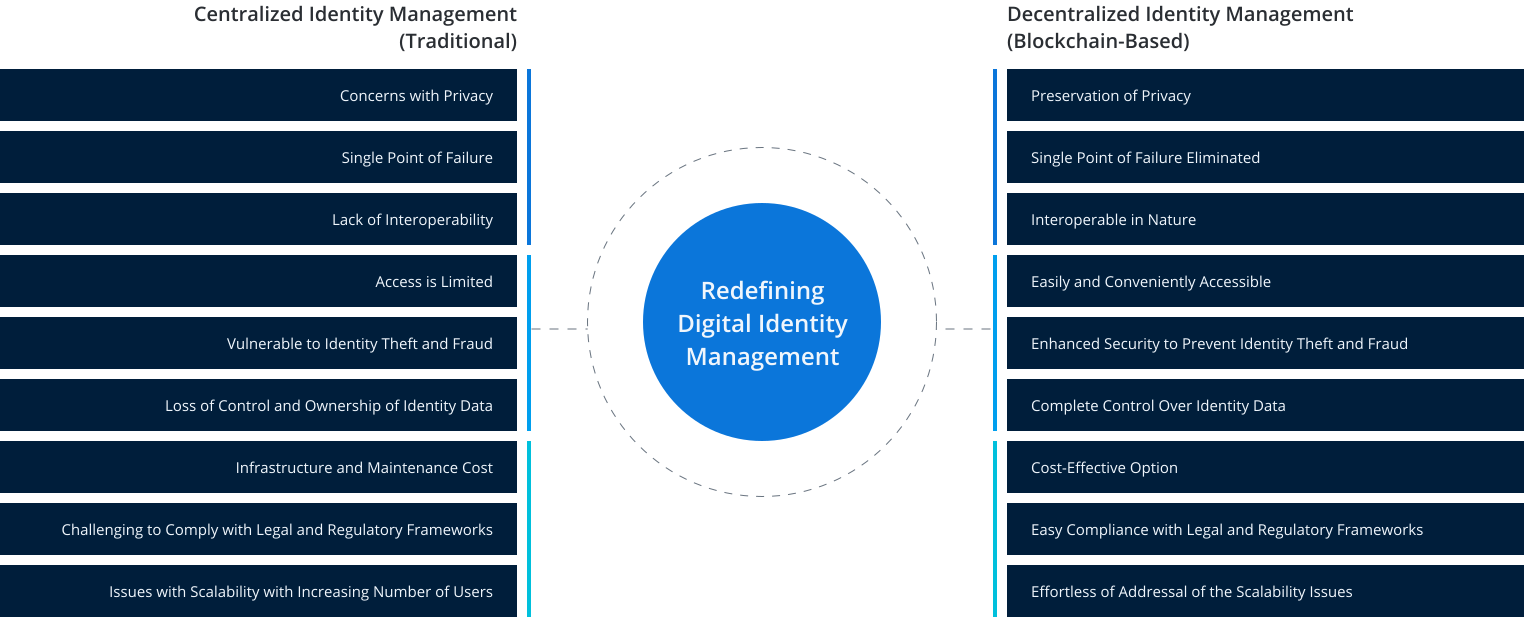Harness the power of blockchain to deliver a secure, immutable ecosystem for digital identity storage and management.

In the modern corporate world, digitalizing identification and credentials has unblocked seamless access to vital documents like vaccination records, academic certifications, professional license and employee IDs. Yet, amidst this convenience, the critical challenge lies in safeguarding the integrity and confidentiality of these highly sensitive assets.
To address this challenge, governments, enterprises and educational institutions are increasingly turning to blockchain technology as a proven solution for creating secure and decentralized digital identity platforms. Adopting blockchain technology systems, they not only enhance the quality and reliability of their services but also demonstrate a strong commitment to data integrity privacy and operational excellence.
Examining the need for bringing in blockchain-based decentralized identity management to deal with the existing barriers in the centralized or traditional identity management system via the face-off.

Blockchain-powered decentralized identity management solutions provide effective solutions to existing challenges, refining the entire process.
Privacy Preservation
Blockchain-based identity solutions empower individuals to maintain full control over their personal data through self-sovereign identity (SSI) principles. It enables users to decide what information to share and with whom, significantly minimizing the risk of unauthorized access or data misuse.
Elimination of Single Point of Failure
Blockchain-based identity systems abolish the threat of a single point of failure by dispersing data across a decentralized network of nodes. Every individual has the power to manage their own identity credentials and engage directly with others without the need for a central authority.
Interoperability
Blockchain-based digital identity solutions pave the way for smooth interoperability by creating a framework for verifying and authenticating identities across various platforms. This allows for effortless integrations and secure data exchange between diverse systems.
Easy Accessibility
Blockchain identification solutions empower individuals with traditional forms of ID by providing portable digital identities that are independent of any specific institution or location. This inclusive approach helps close the digital gaps and promotes financial inclusion, giving everyone access to essential services.
Enhanced Security
Blockchain’s cryptographic features safeguard data security and integrity, making it virtually tamper-proof and impervious to unauthorized alterations. Its decentralized consensus mechanism, blockchain, also offers powerful protection against fraudulent activities such as identity theft and impersonation.
User Control
Blockchain for digital identity places the power of personal data back in the hands of individuals, giving them full control to grant or revoke access and manage consent preferences at any time. This approach promotes a new era of trust and transparency, to shape identity with confidence and security.
Cost Efficiency
Blockchain identity management cuts costs related to identity verification and oversight by removing the need for third parties or intermediaries. Through automation, it streamlines processes, making identity management more efficient and cost-effective.
Compliance with Regulations
Blockchain digtal identity solutions ensures compliacne wth data protection regulations by incorporating strong mechanism for user consent management, data portability and privacy reservation during identity verification. This approach guarantees that personal information is handled securely and transparently.
Scalability
Blockchain digital identity verification tackles the scalability challenges faced by traditional systems. These blockchain-driven identity management solutions are designed to efficiently handle expanding user bases and increasing transaction volumes, ensuring smooth growth and performance.
The integration of blockchain in immigration and border control streamlines identity verification for travellers, enhancing both efficiency and security. This technology ensures a seamless process while safeguarding sensitive information, providing high protection.
Blockchain provides a secure and verified solutions, significantly reducing the prevalence of fake profiles and enhancing the quality of interactions on social media platfroms and other online services.
Blockchain technology Know Your Customer (KYC) AND Anti-Money Laundering (AML) processes, accelerating customer onboarding while enhancing transaction security. This emmpwers financial institutions to deliver faster and more secure peer to peer financial services with greater efficiency and trust.
Governments can leverage blockchain technology to establish a secure, tamper-proof system for issuing essential identification documents such as passports, birth certificates and driver’s licennses. This innovative approach reduces and identify fraud risks while streamlining access to public services for citizens.
Blockchain is reshaping healthcare by putting patients in charge of their medical records, allowing them to securely grant access to providers when necessary. This game- changing innovation protects privacy, simplifies processes and reduces errors, paving the way for more precise and patient-centred care.
Academic credentials gain an added layer of security through blockchain, where they can be securely stored. This enables employers and educational institutions to efficiently and confidently verify the authenticity of qualifications, streamlining hiring and admission processes.
Integrating blockchain into supply chain management ensures strong identity verification fro all participants, gauranteeng product authenticity. This advanced verification acts as a strong deterrent against counterfeiting, protecting the integrity of goods and fostering greater consumer trust.
Selecting the right blockchain framework involves evaluating factors like scalability, consensus mechanisms, privacy, and interoperability. Enterprises must assess their specific use cases, regulatory compliance needs, and integration requirements.
Selecting the right blockchain framework involves evaluating factors like scalability, consensus mechanisms, privacy, and interoperability. Enterprises must assess their specific use cases, regulatory compliance needs, and integration requirements.
Selecting the right blockchain framework involves evaluating factors like scalability, consensus mechanisms, privacy, and interoperability. Enterprises must assess their specific use cases, regulatory compliance needs, and integration requirements.
Minima Blockchain Explained: A Deep Dive into a DePIN-Focused Layer 1 Blockchain
Minima Blockchain Explained: A Deep Dive into a DePIN-Focused Layer 1 Blockchain
Minima Blockchain Explained: A Deep Dive into a DePIN-Focused Layer 1 Blockchain